Religious Freedom

Throughout elementary, middle, and high school, Prabhdeep Suri has been the only Sikh in his class, and it’s been obvious.
Like all Sikh boys, he wore a patka, a head covering for his uncut hair that’s worn out of respect for his gurus. To his classmates, the patka was a license to stare, taunt, isolate, punch, and kick him. It was a target to knock off his head. It was the reason they called him “Osama bin Laden” and “terrorist.”
“He came home crying three days out of five,” his mother, Harpreet Suri remembered. “They were taking his patka off almost every day.”

Barack Obama’s critics allege that the president doesn’t practice what he preaches on international religious freedom policy. Last week they pounced on an apparent gap between presidential rhetoric and reality.
On Thursday, the same day that Obama issued his annual Religious Freedom Day proclamation, Religion News Service published an article highlighting his administration’s failure to quickly nominate a new ambassador at large for religious freedom.
Suzan Johnson Cook resigned in October and a successor has yet to be named. It took the administration well over a year to nominate Johnson Cook in the first place, and then a skeptical Senate took an additional year to confirm her. During her brief tenure Johnson Cook never escaped criticism that she was unqualified for the job.
Even so, Obama used his proclamation to affirm, “America proudly stands with people of every nation who seek to think, believe, and practice their faiths as they choose.” He promised that his administration “will remain committed to promoting religious freedom.”

WASHINGTON — It’s been three months since the Rev. Suzan Johnson Cook resigned as the State Department’s religious freedom watchdog, and those who decry religious persecution in Syria, Sudan, and elsewhere are wondering how long it’s going to take the White House to name a new ambassador-at-large for international religious freedom.
Many in the field hope it’s someone with a more diplomatic background than Johnson Cook, a former Clinton administration official and popular Baptist minister whose international experience was mostly acquired on the job.
The other factor: the more than two years it took for the Obama administration to choose Johnson Cook and to get her confirmed by the Senate.
“A continued vacancy will confirm the suspicion that already exists among foreign governments, persecutors, victims and American diplomats that the issue is not a priority,” said Thomas Farr, director of the Religious Freedom Project at Georgetown University’s Berkley Center for Religion, Peace, and World Affairs.
The White House has been tight-lipped about the timeline for a decision, as well as about any candidates it may be considering for the position, which Congress created in 1998 to highlight and alleviate religious persecution worldwide.
Here’s a short list of five names swirling around Foggy Bottom, culled from experts who work in the field and were asked who they see as likely to be under consideration, or as particularly qualified for the job.

Global religious hostilities reached a six-year high in 2012 and affected more people than government curbs on religious freedom, according to the Pew Research Center’s latest report on religious restrictions around the world.
The report, released Tuesday ahead of National Religious Freedom Day on Thursday, shows that 74 percent of the world’s population experienced high levels of social hostility toward religion, up from 52 percent in 2011.
The sharp rise is due to hostilities in China, which for the first time in the survey’s six-year history, scored a “high” level of religious strife. Home to more than 1.3 billion people, China experienced an increase in religion-related terrorism, mob violence and sectarian conflict in 2012.
The greatest levels of social hostilities toward religion were felt in Pakistan, Afghanistan, India, Somalia, Israel, and Iraq, according to the report.
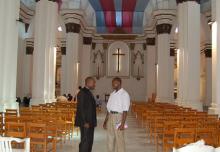
Church leaders in Libya remain hopeful that Christians in the mostly Muslim country will be allowed to practice their faith, even as the country appears to be moving towards Shariah law.
In December, Libya’s General National Congress voted to make Shariah the source of all legislation and institutions. The vote came amid international concerns over the diminishing Christian populations in North Africa and the Middle East, and increased Islamist influence in countries engulfed by the Arab Spring revolution.
Libya has undergone a two-year transition since 2011 when demonstrations toppled Moammar Gadhafi. Before the revolution, Christians were granted religious freedom, but with the change of power, they have been arbitrarily arrested, attacked, killed, and forced by the Islamist groups to convert to Islam.

Rep. Frank Wolf, one of the loudest and most persistent voices in Congress for the right of people around the globe to practice their religions freely, will not seek an 18th term.
“As a follower of Jesus, I am called to work for justice and reconciliation, and to be an advocate for those who cannot speak for themselves,” Wolf, a Presbyterian, said in a statement Tuesday.
The Republican from Northern Virginia, who will turn 75 in January, said he will work on human rights, religious freedom, and other social issues in his retirement.
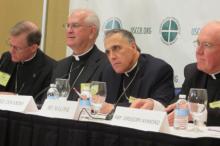
After a closed-door session at their annual meeting in Baltimore this month, the U.S. Catholic bishops issued an unusual "special message" reaffirming their long-standing opposition to the Obama administration’s birth control insurance mandate.
On one level, the declaration and the united front were no surprise: The American church hierarchy has made opposition to the mandate a hallmark of its public lobbying efforts, framing the issue as an unprecedented infringement of religious freedom.
Several bishops even vowed to go to jail rather than comply with the mandate. Others threatened to shutter the church’s infrastructure of hospitals, charitable ministries, schools, and universities rather than accept a policy that they say would force Catholic employers to provide health insurance that covers sterilization and perhaps abortion-inducing drugs as well as contraception.
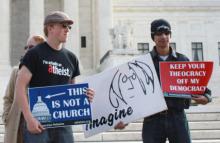
The Supreme Court struggled Wednesday with a case that asks whether government bodies can open with prayers that some people find overly religious and excluding.
From their lines of questioning, it’s unclear whether the court is ready to write new rules on what sort of prayer falls outside constitutional bounds. And more than one of the justices noted that just before they took their seats, a court officer declared: “God save the United States and this honorable court.”
Few court watchers believe the justices will rule all civic prayers unconstitutional — the nation has a long history of convening legislative bodies with such language.
Rather, the question raised by Town of Greece v. Galloway is how sectarian these prayers can get.

Suzan Johnson Cook, the State Department’s ambassador-at-large for international religious freedom, will announce this week that she is resigning after 17 months on the job, according to two sources familiar with her office.
President Obama nominated the former Baptist minister to serve as his top adviser on protecting religious freedom around the world. When confirmed by the Senate in April 2011, she became the first woman and the first African-American in the position, which had been held by two people before her.
Obama had been criticized for taking too much time after his own swearing-in to nominate a religious freedom ambassador, a position created by the International Religious Freedom Act of 1998.
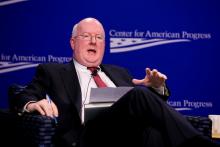
Amid persistent criticism that the U.S. marginalizes religion and religious people in its foreign policy, Secretary of State John Kerry Wednesday tapped ethicist and campaign adviser Shaun Casey to lead the State Department’s new Office of Faith-Based Community Initiatives.
Casey is a professor of Christian ethics at Wesley Theological Seminary in Washington and advised President Obama’s campaign and other Democrats on outreach to religious voters.
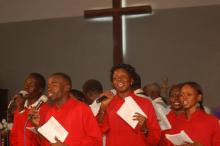
Despite a promise by the Sudanese government to grant its minority Christian population religious freedom, church leaders there said they are beset by increased restrictions and hostility in the wake of the South Sudan’s independence.
In 2011, South Sudan, a mostly Christian region, split from the predominantly Muslim and Arab north, in a process strongly supported by the international community and churches in the West.
The two regions had fought a two-decade long civil war that ended in 2005, following the signing of the Comprehensive Peace Agreement. The pact granted the South Sudanese a referendum after a six-year interim period and independence six months later. In the referendum, the people of South Sudan chose separation.
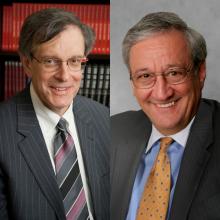
Serving in the armed forces is one of the most honorable professions one can choose in our society. And putting one’s life on the line in defense of freedom is a sacrifice the rest of us can never repay.
That’s why it saddens us that these very freedoms are being undercut by forces seeking to infuse the military with a very specific version of Christian culture. Leaders from the religious right claim that the religious liberty rights of Christians are under assault in the military. This is simply not true, and the implication is an insult to people around the globe and here at home who truly do face persecution for their faith.
What is true is that military life is different than civilian life. A chain of command impacts every aspect of a service member’s life; because of that, safeguards must be in place to ensure that no member of the military is being coerced into religious practices unwillingly.

Daily Show correspondent Samantha Bee's latest segment for the late-night comedy show took on the perception in some religious circles that Christians are the ones being targeted by the LGBT community. She sits down with pastor and Christian radio-show host Matt Slick to explore his fear of infringement of his religious liberty.
"At what point has your right to express yourself been infringed upon?" Bee asked in the interview.
Slick's response: "I don't know if it's going to happen, but I'm concerned about it. I have a radio show. I'm just concerned about any oppression that may come, that people might say, 'Matt, you can say that on the radio, that homosexuality is a sin.'"
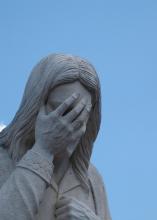
In response to my last article, “ 10 Things You Can't Do While Following Jesus,” I was accused multiple times of being political. All I was trying to do was follow Jesus. So, I thought it'd be interesting (and generate tons more hate mail) to show what a list would actually look like if I were being political intentionally. Like the first list, this is not a complete list, but it's a pretty good place to start.
There will be those who comment and send me messages berating me for “making Jesus political.” It's OK. Fire away. Jesus didn't worry much about stepping on political toes, and the Bible insists that governments be just toward the least of these (the books of the prophets alone make this point very clear). Frequently, people who are the most vocal about not making Jesus political are the same people who want prayer in school and laws based on their own religious perspectives. By a happy little circumstance that brings us to my list:
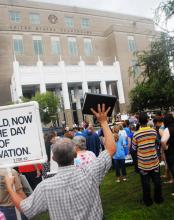
The Puritans sailed to these shores 400 years ago seeking freedom of religion, but freedom of their religion only. Earlier this year, a group of North Carolina lawmakers, apparently channeling the Puritans, tried to establish Christianity as the state religion.
Their action was prompted by a complaint filed by the American Civil Liberties Union. The ACLU noted that some county commissions and other governmental boards around the state opened meetings with prayer. While these various boards had policies that allowed for a multiplicity of religious voices, most prayers were offered in the name of Jesus Christ.
Eleven legislators, all white male Christians, backed a bill to codify Christianity in state law, saying the First Amendment to the U.S. Constitution does not trump the state’s rights. The effort died a quick and merciful death.
These misguided politicians forgot a simple truth – even if a state could mandate a public religion, that wouldn’t change what is in people’s hearts. As Roger Williams wrote in June 1670, “Forced worship stinks in God’s nostrils.” Williams, who was expelled by the Puritans and founded a religious colony in Rhode Island, knew firsthand the importance of religious freedom.
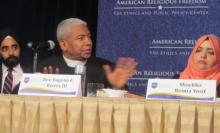
In a conference full of people who champion traditional religious values, Amardeep Singh knew that everyone might not appreciate his recounting of the “uncomfortable” cab ride he had taken the previous day.
Singh, a featured speaker at the second annual National Religious Freedom Conference in Washington on Thursday, told the several hundred attendees that his D.C. taxi driver had the radio tuned to a religiously minded commentator, who was explaining that women become lesbians because they had been abused.
His cab story — both his telling and the reaction to it — reveals fault lines in the coalition of Americans concerned that government and popular culture are eroding religious freedom and trying to banish religion from the public sphere.

The Obama administration isn’t afraid to call out Republicans for playing politics on Capitol Hill, or Wall Street for runaway profits or insurance companies for health care woes.
But why, when it comes to protecting religious freedom abroad, is the State Department so hesitant to name names?
Watchdogs say the State Department missed a key opportunity to put teeth into its annual assessment of global religious freedom, which was released by Secretary of State John Kerry Monday.
Continuing a pattern begun under President George W. Bush, the report does not include a list of “countries of particular concern,” or “CPCs” — the diplomatic term for countries that either actively suppress religious freedom or don’t do enough to protect it.

Editor's Note: Below is the text of President Barack Obama's Proclamation for the National Day of Prayer.
Americans have long turned to prayer both in times of joy and times of sorrow. On their voyage to the New World, the earliest settlers prayed that they would "rejoice together, mourn together, labor, and suffer together, always having before our eyes our commission and community in the work." From that day forward, Americans have prayed as a means of uniting, guiding, and healing. In times of hardship and tragedy, and in periods of peace and prosperity, prayer has provided reassurance, sustenance, and affirmation of common purpose.
Prayer brings communities together and can be a wellspring of strength and support. In the aftermath of senseless acts of violence, the prayers of countless Americans signal to grieving families and a suffering community that they are not alone. Their pain is a shared pain, and their hope a shared hope. Regardless of religion or creed, Americans reflect on the sacredness of life and express their sympathy for the wounded, offering comfort and holding up a light in an hour of darkness.

It can be hard to come up with a list of countries with the most egregious records on religious freedom when some of the world’s worst offenders aren’t even nation states.
For its annual report of violators, the U.S. Commission on International Religious Freedom counts 15 nations where abuse of religious liberty is “systemic, egregious, and ongoing.”
But the commission, which was created by Congress in 1998 as an independent watchdog panel, also wants to highlight the crimes of non-nations, which for the first time this year get their own section in the report.

COLUMBUS, Ohio — Thirteen state attorneys general are urging the federal government to broaden religious exemptions for private businesses under the White House’s contraception mandate, claiming the policy violates religious freedoms.
Put simply, the group believes any employer who says he or she objects to contraception should not have to provide contraceptive coverage.